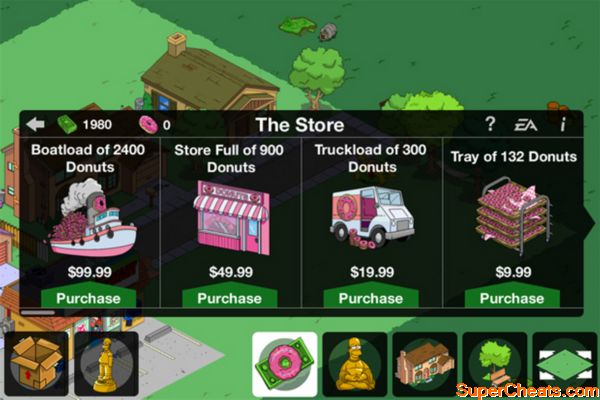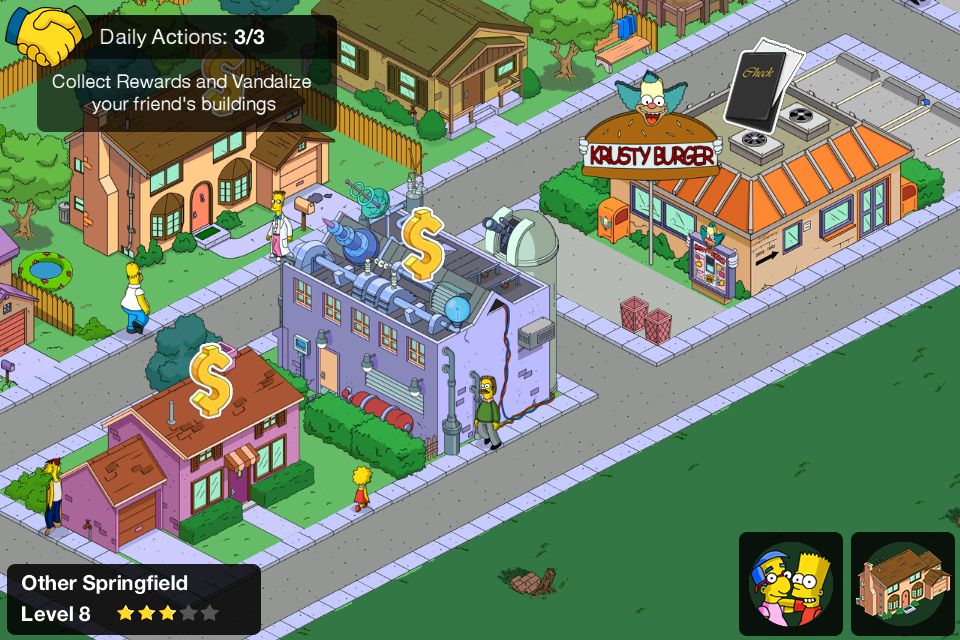
What do you get when you cross Farmville with The Simpsons? Well kind of like, I don’t know. The game is immediately a bit of a mystery to me because it sort of paints itself out to be EA’s hugely relevant and clever response to the advent of social clone-villes– you know, the games where you repetitively tap on the screen to do things like collect money and grow crops and feed dragons– while still offering up a game that does exactly that and doesn’t really shift the formula very much. Oh yeah, and we shouldn’t forget that it’s made by EA, because the game hasn’t either. It even occasionally remarks on its existence as a social game, which I suppose is the technical definition of the genre and we shouldn’t really fight that.
About that– the game actually likes to talk about itself being a game quite a lot. Homer Simpson actually blows up Springfield due to the fact that he’s racking up points via crop-ville (on his iPad, no less) and not really paying attention to the nuclear meltdown occurring in the background. So, okay– after the city is apparently spared the whole ‘Three Mile Island’ outcome but nonetheless destroyed– you are tasked with helping Homer and Lisa rebuild their humble town into some kind of Springfield 2.0. Homer specifically, likes to gripe at the player with quips like, “Ahh man, I wish this were a shooter game!” when you assign him tasks such as [Clean up Springfield] or [Attend Church]. And it’s cute, actually. It serves to remind you that you are playing a Simpsons game and not just a unscrupulous knock-off with no soul. The Simpsons games prior (Hit and Run, Road Rage, etc) have always exhibited a fair bit of meta so it’s nice to see that here in full-form. However, I don’t know. The fun shit kind of stops there.
As a writer, I’m always tickled when a game goes out of its way to lampshade some of its more illogical abstractions (Professor Frink teleports into your version of Springfield to tell you that the radiation has caused time-altering rifts in space, allowing the player to jump into other Springfield timelines e.g. so you can visit your friend’s towns à la farmville reach-around style) but the game is so painfully aware of it’s own dysfunctional ties to the social game formula that it makes you wonder why they didn’t just change it in the first place. Not to mention the whole ‘donut’ mechanic of this game, which functions like every other social game’s premium content token, allowing you to speed things up or purchase exclusive decorations or characters. There may not be a whole lot to do, but at least I can buy Sherri and Terri for a grand 150 donuts, which is something like twelve fucking dollars, fyi.
Donuts aside, it follows the whole social game formula pretty religiously: houses and stores accrue money over a period of time, and after tapping on the lot, you’re able to collect the money and experience– very traditional. But the game really emphasizes ‘tapping’ here and you have to manually pick up the individual money bundles to add them to your bank, or whatever. This involves maneuvering your finger so it specifically makes contact with the money (why, not a fraction of leeway in my Simpsons game), and if any of them are positioned over a building or a character, well then guess what– you’re probably going to end up doing a lot of needless menu fiddling. Compounded by the fact that every UI panel features a re-positioned ‘exit’ button on the the left-hand side of the screen that has been made to resemble the size of a pea– so when you do accidentally tap on something unintended (50% chance here) exiting that menu is always a fun-filled crapshoot of awful. It’s a design choice that’s unintuitive and frustrating and gets in the way of one of its own core gameplay mechanics: collecting money and experience so you can play the fucking game.

Speaking of money (the resource that allows you to do everything in this game): Houses and stores make money every 30 or 40 seconds or so– tiny tiny amounts of money. But once the Kwik-E-Mart has finished ticking, for instance, that money just stops accruing. Which means the most effective way to play the game is to be interacting with it every 30 or 40 seconds or so. Otherwise, you’re not making enough money to do anything. Which, if my egregious overuse of italics here are expressing anything to you, it’s that this is a huge problem. Because if you don’t have money– you can’y buy new houses, you can’t complete missions, you can’t do shit. I had barely exited the tutorial only to find that the pace of the game had already plateaued– my sole means of continuing seemingly barred, lest I assign Homer the task: [Watch Monkey Trauma Center Marathon] which would have taken all of 24 fucking hours.
Which is kind of an issue because when we make video games, we kind of want people to play them. But the Simpsons: Tapped Out quickly falls prey to the un-fun mechanic of waiting around for dumb stuff to happen. So, not like I’m an expert at Cropville, DragonVille, or WhateverVille– but with these kinds of games, the overall flow of money is kind of a big deal (because it controls everything about the game) and needs to be adjusted rather carefully so that the players have something to work towards but don’t feel as though their goals are impossible or implausible to reach. Without a doubt, these issues might very well fade away once you’ve established a nice little town, but god damnit, it’s like the game doesn’t want you to get there.
Which is a huge shame (that the game is not fun to play), because it’s visually eye-catching and sharp. The fidelity on the textures is surprisingly high, and the whole game just looks like the show– which is pretty cool considering that every sprite has multiple animations and ‘rotations’, depending on where the buildings or characters are facing. It’s plain to see that a lot of work went into this game, it just seems like with a little more thought, these minor kinks could have been worked out.
